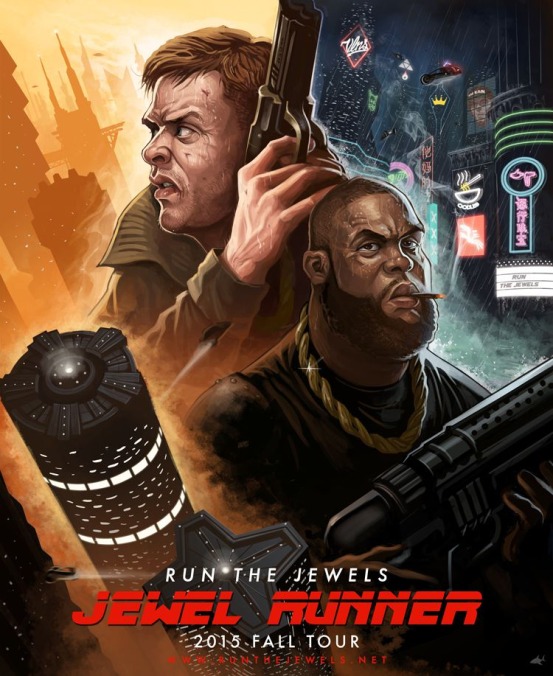Beats, rhymes, and replicants: El-P, Gary Numan, and more on Blade Runner’s musical influence

According to WhoSampled, that endlessly useful resource for determining which artists should probably be sued, bits of Blade Runner have been paid homage to—and straight-up pilfered—more than 80 times in the past 35 years, turning up in works from everyone from Ryuichi Sakamoto to Sigue Sigue Sputnik. Rutger Hauer’s climactic “Tears In Rain” monologue alone has been sampled a dozen times: GWAR nicked its dialogue, as Revolting Cocks did previously, for its 2013 thrasher “Madness At The Core Of Time.” British electronic producer Zomby liked the speech so much, he made it the centerpiece of his 2008 song, “Tears In The Rain.” Vangelis’ mesmerizing synth score, too—from the cinematic gleam of its “Main Titles” to the space-noir jazz of “Blade Runner Blues” to the haunting “Rachel’s Song”—has lent its neon shimmers to dozens of songs from the likes of The Future Sound Of London, Dillinja, and Aesop Rock. All told, there may be no more sampled movie in history than Blade Runner, a film whose story about synthetics seeking more borrowed life has been continued in the many musical replicants it’s spawned.
“I actually sampled it right off the VHS for one of my earlier records—which I will not say which one it is, because I don’t want to get arrested,” El-P tells The A.V. Club. (He’s probably talking about Company Flow’s “Info Kill II,” but don’t tell the cops.) “When I was coming up, most people in my genre were still going with the classic breaks and funk stuff,” the rapper/producer adds. “But I was collecting Vangelis. I was pulling from these really moody, synth-heavy film scores. Most synth use was relegated to a Zapp, funk kind of vibe. But film scores have always been huge for me, because of the emotional connection. And I thought it was nasty to play around with that.”
El-P, who even mounted a 2015 Run The Jewels tour modeled on the film’s design, may be hip-hop’s—if not modern music’s—most visible Blade Runner fan. He’s spent his entire career paying homage to the technocratic nightmares of Philip K. Dick, both directly (his verse on Mike Ladd’s “Bladerunners” is practically an IMDB summary) and in dystopian spirit, rapping his own paranoid visions of drones and death squads from deep inside a seething, laser-strobed machine.
“It had a tone to it that I’d never encountered before,” he says of first seeing Blade Runner as a kid. “It just had a vibe that was really fascinating, and it made me emotional. It made me feel something… This feeling of being fatalistic and romantic, this tension. It definitely influenced me.” Plus: “It had fucking flying cars, man. Good lord.”
Flying cars aside, the allure of Blade Runner—and Dick’s writing in general—is how it belies the promise of technological utopia that’s been floated by so much science fiction. It’s a world where Spinners glide through towering skyscrapers and the wealthy live, Metropolis-style, in golden monoliths, but the people below are squatting in burned-out buildings with leaky roofs and still calling each other on pay phones. “It’s based in something real, which is that the future is filled with old ideas gone wrong,” El-P says. “The future is filled with junk. I like the idea of sentience being this kind of stumbling, fucked-up thing. Do we really think that we have the ability to birth a purer sentience than we’re capable of achieving? It was always way more a comment on who we are than any interest in the future.”
That same sci-fi social commentary and postmodern pessimism has long informed El-P’s lyrics, while the score’s brooding, cybernetic sweep defines his sound—now quite literally. The guy who grew up ripping Vangelis’ sounds from a VHS tape (partly owing to the score’s frustrating, decade-plus-long journey to release) recently fulfilled a childhood dream by shelling out around $25,000 apiece for not one, but two Yamaha CS-80s, the extremely rare synth the composer used to create it. One keyboard belonged to Eddie Van Halen, while he stumbled upon the other—which Stevie Wonder had used on The Secret Life Of Plants—in a Brooklyn music store.
The CS-80’s sweeping tones, surging through pressure-sensitive keys that were ideal for Vangelis’ improvisatory way of composing, can be heard throughout Run The Jewels 3. And as El-P recently revealed, he even got to put them to use on the ultimate Blade Runner nerd fantasy project: scoring the trailer for Blade Runner 2049, even though his take was ultimately rejected.








































